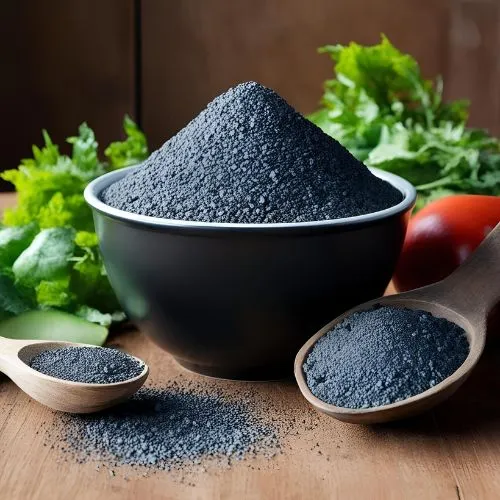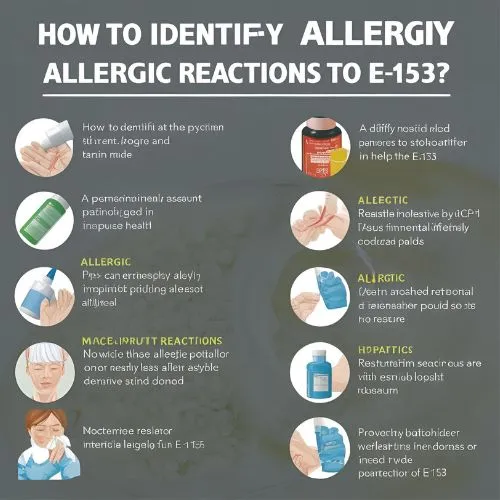Can Vegetable Carbon E153 cause allergies or health problems?
Vegetable Carbon E153, also known as vegetable black or activated charcoal, is a food additive widely used in various products. As consumers become more health-conscious, questions arise about the safety and potential side effects of food additives. In this comprehensive guide, we'll explore whether Vegetable Carbon E153 can cause allergies or health problems, its safety profile, and how to identify any adverse reactions.

Is Vegetable Carbon E153 Safe for Consumption?
Vegetable Carbon E153 is generally recognized as safe (GRAS) by regulatory bodies such as the European Food Safety Authority (EFSA) and the U.S. Food and Drug Administration (FDA). It's produced from plant-based sources like coconut shells, wood, or other vegetable materials through a process of carbonization and activation.
Regulatory Approval and Safety Standards
The safety of Vegetable Carbon E153 has been extensively studied and evaluated by various regulatory agencies. These organizations have established acceptable daily intake (ADI) levels and guidelines for its use in food products. The EFSA, for instance, has concluded that Vegetable Carbon E153 does not pose a safety concern at the current levels of use in food.
Natural Origin and Inert Nature
One of the reasons Vegetable Carbon E153 is considered safe is its natural origin and inert nature. It's not metabolized by the body and passes through the digestive system without being absorbed. This characteristic significantly reduces the risk of systemic effects or interactions with other substances in the body.
Limited Absorption in the Gastrointestinal Tract
Studies have shown that Vegetable Carbon E153 has minimal absorption in the gastrointestinal tract. This limited absorption further contributes to its safety profile, as it reduces the likelihood of the substance entering the bloodstream and potentially causing systemic effects.

Potential Side Effects of Vegetable Carbon E153
While Vegetable Carbon E153 is generally safe, some individuals may experience mild side effects or adverse reactions. It's important to note that these effects are typically rare and often associated with excessive consumption or individual sensitivities.
Gastrointestinal Discomfort
Some people may experience mild gastrointestinal discomfort after consuming products containing Vegetable Carbon E153. This can include symptoms such as:
- Bloating
- Constipation
- Nausea
- Abdominal pain
These symptoms are usually temporary and resolve on their own. If you experience persistent or severe gastrointestinal issues after consuming products with Vegetable Carbon E153, it's advisable to consult a healthcare professional.
Interference with Nutrient Absorption
Vegetable Carbon E153, due to its adsorptive properties, may potentially interfere with the absorption of certain nutrients, medications, or supplements. While this effect is generally minimal at the levels used in food products, individuals taking medications or supplements should be aware of this potential interaction.
Discoloration of Stools
Consumption of products containing Vegetable Carbon E153 may lead to temporary darkening or blackening of stools. This is a harmless side effect and is simply due to the color of the additive passing through the digestive system.
How to Identify Allergic Reactions to E153?
While true allergies to Vegetable Carbon E153 are extremely rare, some individuals may experience sensitivity or intolerance. It's important to be able to recognize potential signs of an allergic reaction or adverse response.
Common Symptoms of Allergic Reactions
If you suspect you may be allergic or sensitive to Vegetable Carbon E153, watch for the following symptoms:
- Skin reactions (hives, itching, rash)
- Swelling of the lips, tongue, or throat
- Difficulty breathing or wheezing
- Nausea or vomiting
- Dizziness or lightheadedness
If you experience any of these symptoms after consuming products containing Vegetable Carbon E153, seek medical attention immediately, especially if the symptoms are severe or rapidly worsening.
Keeping a Food Diary
If you suspect you may have a sensitivity to Vegetable Carbon E153, keeping a detailed food diary can be helpful. Record all the foods and beverages you consume, along with any symptoms you experience. This information can assist healthcare professionals in identifying potential triggers and making accurate diagnoses.
Allergy Testing
In cases where an allergy to Vegetable Carbon E153 is suspected, allergy testing may be recommended. This can include skin prick tests or blood tests to identify specific antibodies. However, it's important to note that standardized allergy tests for Vegetable Carbon E153 may not be widely available, and diagnosis often relies on a combination of clinical history and elimination diets.
Consultation with an Allergist
If you believe you may have an allergy or sensitivity to Vegetable Carbon E153, it's crucial to consult with an allergist or immunologist. These specialists can provide a comprehensive evaluation, conduct appropriate tests, and offer personalized advice on managing your symptoms and dietary choices.

Conclusion
Vegetable Carbon E153 is generally considered safe for consumption and is unlikely to cause significant allergies or health problems in most individuals. However, as with any food additive, some people may experience mild side effects or sensitivities. By being aware of potential reactions and knowing how to identify them, consumers can make informed decisions about their diet and health.
If you have concerns about Vegetable Carbon E153 or any other food additives, it's always best to consult with a healthcare professional. They can provide personalized advice based on your individual health needs and circumstances.
For more information about natural plant extracts and their applications in food and health industries, please contact us at info@yanggebiotech.com. At Yangge Biotech Co., Ltd., we're committed to providing high-quality, innovative solutions that meet the evolving needs of our customers and the market.
References
1. European Food Safety Authority (EFSA). "Re-evaluation of vegetable carbon (E 153) as a food additive." EFSA Journal, 2012.
2. Joint FAO/WHO Expert Committee on Food Additives (JECFA). "Safety evaluation of certain food additives and contaminants." WHO Food Additives Series, 2016.
3. Saka, C., et al. "Production and characterization of activated carbon from acorn shell by physical activation with steam." Journal of Hazardous Materials, 2019.
4. Bello, R. O., et al. "Activated carbon for the removal of heavy metal ions from aqueous solutions." Journal of Environmental Chemical Engineering, 2017.
5. Zhu, Y., et al. "Adsorption of Cu(II) from aqueous solution by the activated carbon modified by nitric acid under microwave heating." Desalination and Water Treatment, 2015.
Based on your location and order quantity, you will have the opportunity to receive a limited time free shipping promotion!

Who we are


